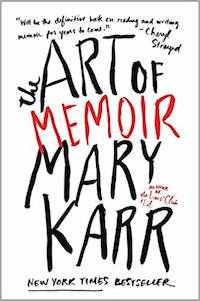


Above all else, she suggests, it is a democratic telling open to anyone who has lived. Don DeLillo's thought that "a fiction writer starts with meaning and then manufactures events to represent it a memoirist starts with events, then derives meaning from them" reinforces, for Karr, that "memoir purports to grow more organically from lived experience." A lifetime of reading and writing memoir has persuaded Karr that it is "an art, a made thing." Memoir, for Karr, is many things. The "first-person coming-of-age story, putatively true" gave the child Karr hope, she writes. In her new book, "The Art of Memoir," Mary Karr - beloved memoirist and Peck professor of literature at Syracuse University - finds herself foiled in her quest for a "Unified Field Theory" for the category.

When we write about the writing of memoir, we are stuck, up front, with the lexicographer's dilemma: How do we define the word? Is memoir, for example, an autobiographical poem? Is it essay, "new journalism," fiction that feels true, ghost stories, an A-to-Z recounting of me? Is it narcissism, and if it is narcissism, what finally redeems it? Memoir can take many forms.


 0 kommentar(er)
0 kommentar(er)
